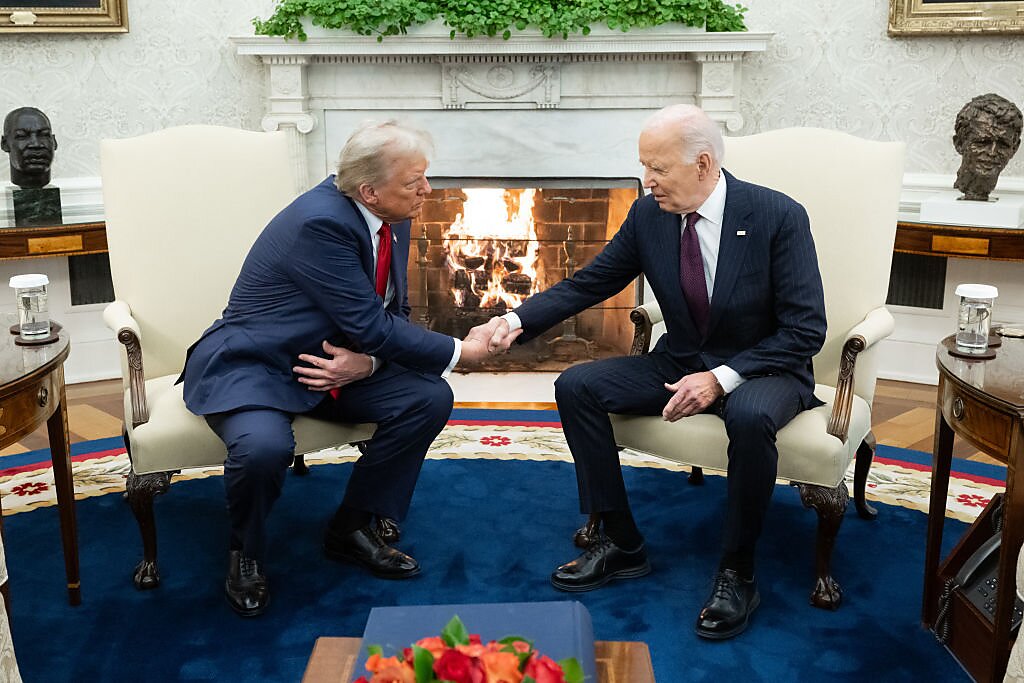Although the incoming Trump administration says it will cut taxes, reduce regulations, and slash wasteful government spending—all of which are good things—it also intends to enact an industrial policy to bolster US manufacturing, using interventionist tools such as tariffs, subsidies, Buy American rules, and similar commands—all of which are bad things and inherently anti-liberty.
“On January 20th, as one of my many first Executive Orders, I will sign all necessary documents to charge Mexico and Canada a 25 percent tariff on ALL products coming into the United States,” wrote Trump on Truth Social. The president-elect has also threatened to impose a 60 percent tariff on all goods imported from China.
Government intervention in the economy, to nearly any degree, never works well because the government is incapable of knowing all the information that goes into, for instance, making cars or anticipating what consumers want. All that data only works harmoniously (and spontaneously) in a free market. As economist Friedrich Hayek explained, “The free market constitutes an information-gathering process, able to call up and put to use widely dispersed information that no central planning agency, let alone any individual, could know as a whole, possess or control.”
Thus, it is no mystery why the government did not invent the iPhone or Uber.
You’d think that real estate tycoon Donald Trump and venture capitalist JD Vance understood that, and perhaps they quietly do. But their proposed meddling in the market through industrial policy is a form of what Ludwig von Mises, Hayek’s mentor, called interventionism, or “a hampered market” economy. (Bear in mind that the Biden, Obama, and Bush administrations also implemented industrial policies.)
With interventionism, the government “seeks to influence the market by the intervention of its coercive power,” wrote Mises. “It desires that production and consumption should develop along lines different from those prescribed by the unhindered market, and it wants to achieve its aim by injecting into the working of the market orders, commands, and prohibitions….”
Those commands—espoused by Trump-Vance and Biden-Harris—can include price controls, tariffs, immigration restrictions, subsidies, licensing, minimum wage rates, and other steps. The government says it is protecting certain domestic industries hurt by unfair trade or a “market failure.” Its list of victims may include, for instance, US steel, Detroit automakers, semiconductor businesses, or solar panel manufacturers.
Industrial policy advocates also often claim they are serving the “national interest” or “national security”—hence they lecture, “Buy American” (instead of buy what you want). When Trump imposed tariffs on imported steel and aluminum in his first term, he repeatedly said it was for “national security” reasons. President Biden recently said the same in denying the purchase of US Steel by Nippon Steel.
In a Cato White Paper, Scott Lincicome defines industrial policy as a broad government plan to fix market failures, which focuses on manufacturing, imposes industry-specific support (e.g., tariffs or subsidies), and requires that outcomes “be generated within national borders.” This policy is often termed economic nationalism or economic protectionism. Lincicome quotes economic historian Ellis Hawley, “By industrial policy I mean a national policy aimed at developing or retrenching selected industries to achieve national economic goals.”
Trump’s trade agenda is pure industrial policy (as was Biden’s and Obama’s). In addition to tariffs on imports from Canada and Mexico, Trump is targeting China’s electric cars. “They’re going to pay a 100 percent or maybe even a 200 percent tariff because we’re not going to let them come into our country and destroy what’s left of our auto industry,” Trump told the Detroit Economic Club in October. (He didn’t mention that the cost of that tariff, which is a tax, is largely passed on to American consumers.)
That’s one type of industrial policy: Washington intervenes in the car market to try to force a desired result. It shields domestic automakers from competition, which reduces the supply of cars, which raises prices for autos. Thus, US consumers are denied the freedom to buy the car they want at market prices. The consumer, moreover, is the last thing on the industrial policymaker’s mind. As Trump said, “we’re not going to let them [vehicles] come into our country.” In other words, the government will decide what car choices are available to you.
It is anti-freedom. As Mises explained, “Either the consumers’ demand as manifested on the market decides for what purposes and how the factors of production should be employed, or the government takes care of these matters.” An industrial policy means that the government will handle certain matters by force. It will use restrictive measures.
The 2024 Republican Party platform lists some of those restrictions:
- Republicans will support baseline Tariffs on Foreign-made goods, pass the Trump Reciprocal Trade Act, and respond to unfair Trading practices.
- Republicans will revive the US Auto Industry by reversing harmful Regulations, canceling Biden’s Electric Vehicle and other Mandates, and preventing the importation of Chinese vehicles.
- Republicans will strengthen Buy American and Hire American Policies, banning companies that outsource jobs from doing business with the Federal Government.
- Our Policy must be to revive our Industrial Base, with priority on Defense-critical industries. Equipment and parts critical to American Security must be MADE IN THE USA.
That fits Lincicome’s industrial policy definition to a T. It is economic protectionism (tariffs) designed to achieve national economic goals (revive industrial base). Yet by targeting certain industries for protection (and banning others) in the name of “security,” the policy seeks to pick winners and losers. This is a doomed strategy, as Hayek’s knowledge problem makes clear.
Hayek understood that “society and the economic process are now so complex that they are beyond the capabilities of any planner or planners to comprehend,” wrote Eamonn Butler in his monograph on the Nobel laureate. Winners and losers are determined by the marketplace—not by a bureaucracy in DC.
Another example of industrial policy is the Merchant Marine Act or Jones Act. Although it was implemented in 1920 under Democratic President Woodrow Wilson, the Act has been supported by Republican and Democrat administrations since then, Biden and Trump included. The law, citing national security, mandates that the sea transport of cargo between US ports must be performed by vessels that are US-built, US-owned, and US-crewed.
In his first administration, Trump considered a 10-year waiver on the Jones Act but changed his mind after meeting with some lawmakers. “The president’s decision to maintain the Jones Act is a victory for American jobs and National Security,” said Sen. Roger Wicker (R‑MS) at the time. Sen. John Kennedy (R‑LA) stated, “I am confident that he [Trump] realizes how important the Jones Act is to Louisiana’s maritime industry and that no changes will be made. Our maritime industry is part of the lifeblood of Louisiana and the Gulf Coast economy. It would be foolish to push aside those jobs in favor of foreign-made and foreign-crewed ships.”
Again, “national security” and save us from “foreign-made” ships. That’s protectionism. And insulating the US maritime industry from the discipline of the market does not make the industry more competitive or America necessarily safer. Because of the Jones Act, “the US has the highest shipping costs in the world,” according to Cato’s Colin Grabow. (On Dec. 18, Trump tweeted an article defending the Jones Act, which suggests he will maintain the measure in his second term.)
The Jones Act has evaded real reform for nearly 100 years because of the special interests—not consumers—that have protected it (including political forces in coastal states like Louisiana and Mississippi). As Mises reminds us, “nearly every restrictive measure brings advantages to a limited group of people while it affects adversely all others, or at least a majority of others. The interventions, therefore, may be regarded as privileges, which are granted to some at the expense of others.”
By design, industrial policy is targeted protectionism: the government grants privileges to certain industries claiming that these restrictive measures will help restore manufacturing, create jobs, and strengthen the nation. This policy is anti-liberty because, among other things, it is anti-consumer.
“The ultimate target of protectionism is fellow citizens peacefully spending their own money,” says economist Donald J. Boudreaux, a Cato adjunct scholar. “These fellow citizens are treated as enemies whose voluntary actions must be curtailed.” However, industrial policymakers don’t directly criticize their fellow American consumers. They blame imports and unfair competition. E.g., “Foreigners are stealing our markets! Stop them!”
But as Boudreaux explains, “Our modern prosperity exists only insofar as consumers are free to spend their money in whatever peaceful ways they choose. It is this freedom that enables consumers to reveal which particular goods and services they want eagerly enough to justify being produced. The further this freedom is restricted, the more meager is the knowledge about how resources can best be used.”
And that’s why industrial policy is misguided and destructive: because there is no way the government can comprehend or calculate the billions of decisions that consumers make when they buy and sell stuff all over the country every second of every day. If an administration tries to do that, say, with an industrial policy, it only creates problems and then often uses more authoritarian means to enforce its flawed policy.
As Mises made clear, “What the interventionist aims at is the substitution of police pressure for the choice of the consumers. All this talk: the state should do this or that, ultimately means: the police should force consumers to behave otherwise than they would behave spontaneously.”
We saw this, for instance, with the subsidies and tax credits the Biden administration offered to persuade people to buy EVs (and manufacturers to make them). The incoming Trump administration plans to impose tariffs on Chinese-made EVs to nudge US consumers towards other auto brands. There are similar industrial policies concerning energy, batteries, chemicals, medical goods, cranes, washing machines, sneakers, canned tuna, tobacco, and even paper clips. The list goes on and includes producer subsidies, such as loans, grants, and tax breaks.
All this intervention is bad news, whether from the left or the right. As Butler wrote, “One of the most powerful themes of The Road to Serfdom is that even modest economic planning has the effect of slowly but inexorably eroding the values and attitudes which are vital if freedom is to exist. … [W]hen the government starts to protect the monopolies and special privileges of particular groups for whatever reason, then the erosion of liberty has begun.”


























